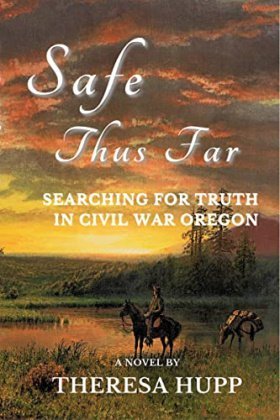“Nothing?” Jenny’s heart fell.
He led her into the parlor, and they sat. Maria was the only child still awake, and she followed them. “We talked to the storekeeper I’d seen before,” Mac said. “He didn’t remember anything more. We talked to other men in the area—none of them remembered the boys or their horses.”
Pain radiated throughout Jenny’s body, from her womb where the baby kicked to her heavy heart. She groaned low in her throat and sagged against Mac.
“You shouldn’t be up,” he said, lifting her into his arms.
She sobbed. “William. Where’s my boy?” As Mac carried her up to bed, Jenny heard Maria crying as well.

The next morning Jenny rose and started her usual routine, but her feet dragged. “You need to rest,” Mac said, urging her to return to bed.
“I can’t,” Jenny said. “Our family needs me.” She forced herself downstairs, helped Mrs. O’Malley with breakfast, then set the younger children to their tasks and chores.
All the while, she thought about William. It had been two months now since she’d seen him. Two months of not knowing where he was or how he managed. She touched her belly as she did frequently these days. This little one might never meet its oldest brother.
Maria convinced Jenny to sit in the parlor after the noon meal. “What do you think has happened to Will?” Maria asked, as they sewed.
When Jenny saw the pain in her daughter’s eyes, she did her best to smile. “I’m sure he’s fine,” she said, with a quick hug for the girl. “William is very resourceful. And so is Jonah Pershing. Those boys will cope with whatever they find.”
She tried to persuade herself that what she told Maria was true.
Chapter 35: Rendezvous with the Wagons
The reconnaissance force left camp on the Sprague River at first light on Sunday and traveled through the river valley. It rained off and on through the day, and the group only made eleven miles. They crossed the Sprague at another gravel bar, a crossing very like the ford on the Williamson River, and continued through the broad valley.
The Sprague was a pretty stream, wide and shallow, with a gentle babbling current. “How wide you think the river is?” Will asked Joel.
Joel squinted. “I’m guessin’ thirty yards.”
Jonah pointed. “A fish jumped over yonder. Might try my luck with my pole again tonight. Fresh trout beats jerky any day.”
Joel laughed. “Sergeant Crockett’ll thank you for savin’ his provisions. But the mules don’t wanna carry their loads any longer’n they have to. They’d prefer we eat what’s stowed on their backs quick as we can.”
They camped on the Sprague again Sunday night. Cottonwoods and willows fringed the riverbanks. Spongy marshes and grasslands covered the lowlands, and a pine forest spread over the valley and up the mountainsides. Lava outcroppings poked through where winds or mudslides had eroded the hillsides.
Drew’s presence seemed to subdue the cavalry. The soldiers sat upright on their horses all day, despite the dripping skies. And their tents in camp evenly spaced in rows along the riverbank.
The packers didn’t change their ways, Will noted, their ramshackle camp set slightly apart from the soldiers. “We can drink easier by ourselves,” Joel commented. “The officers won’t let the soldiers imbibe. Not if we’re underway again tomorrow. But they hold less sway over us.”
“Even Sergeant Geisy?” Will asked.
“Geisy can shout, but he needs us packers,” Joel said. “Not much he can do.”
July 3, 1864. Traveled eleven miles under rainy skies. Our first day with Drew. Camped on the Sprague. Jonah caught trout for dinner.

The next day was July 4, and Will was awakened by cavalrymen shooting off pistols. Will had hoped the expedition would celebrate Independence Day, but Drew quickly stopped the gunfire. “Don’t waste your bullets,” Will heard him shout. “Might need them for Indians or bears.”
As he spoke, the cavalry’s howitzer shot off one round, and Captain Kelly chastised the soldiers severely.
After hearing the captain’s tirade, Will and Jonah kept their rifles in their scabbards and didn’t emulate the soldiers. Instead, they feasted on the trout Jonah caught the evening before. “That’s all the Independence Day we’ll get,” Jonah muttered. “Old Drew don’t seem inclined to honor the Fourth.”
“We gotta meet those wagons,” Joel said. “He’s delayed in gettin’ us there long enough, and now he’s fixin’ to make up time.”
But Drew still seemed in no hurry. That day they only traveled eight miles through the Sprague River Valley. Their camp that night was on a smaller creek, not on the Sprague itself. They had neared the rendezvous point, and the creek was a decent camp where they could wait.
July 4, 1864. Independence Day. Camped on a creek. Only made eight miles.
The next morning, Drew and Mr. Richardson rode out of camp, along with the expedition’s Indian scouts and a small squad of mounted soldiers. “Where are they going?” Will asked Joel.
Joel shrugged. “No idea. Lemme see what Sergeant Crockett says.” And he sauntered off.
An hour later, Joel returned. “Quartermaster says Drew went with his scouts to see if he can find the Indian bastards what attacked the trains.”
“By themselves?” Will asked, surprised. “They only took a small cavalry guard with them.”
“Seems Drew wants to question an Indian he knows in these parts. He ain’t gonna attack nobody.”

























